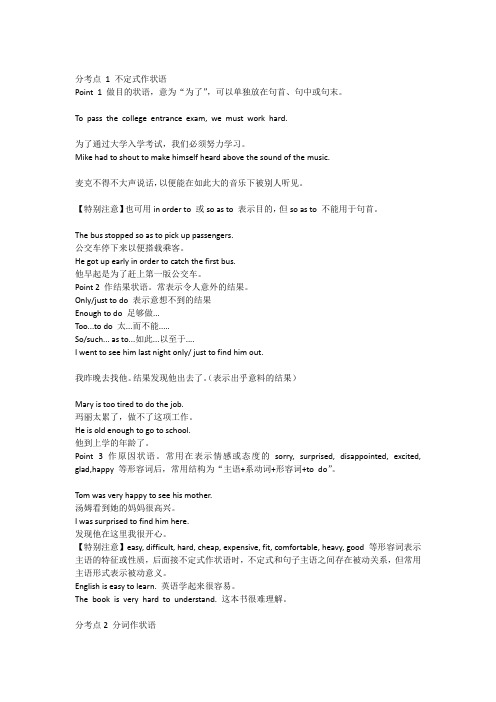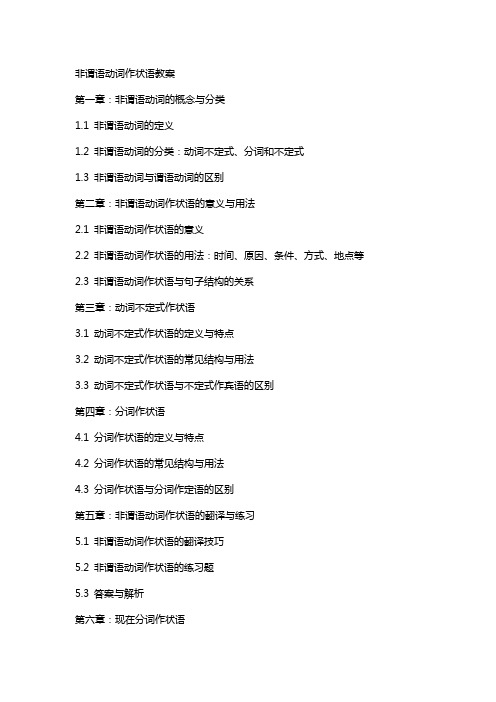最新非谓语动词作状语
高考英语非谓语动词作状语的用法 知识点

分考点1 不定式作状语Point 1 做目的状语,意为“为了”,可以单独放在句首、句中或句末。
To pass the college entrance exam, we must work hard.为了通过大学入学考试,我们必须努力学习。
Mike had to shout to make himself heard above the sound of the music.麦克不得不大声说话,以便能在如此大的音乐下被别人听见。
【特别注意】也可用in order to 或so as to 表示目的,但so as to 不能用于句首。
The bus stopped so as to pick up passengers.公交车停下来以便搭载乘客。
He got up early in order to catch the first bus.他早起是为了赶上第一版公交车。
Point 2 作结果状语。
常表示令人意外的结果。
Only/just to do 表示意想不到的结果Enough to do 足够做...Too...to do 太...而不能.....So/such... as to...如此...以至于....I went to see him last night only/ just to find him out.我昨晚去找他。
结果发现他出去了。
(表示出乎意料的结果)Mary is too tired to do the job.玛丽太累了,做不了这项工作。
He is old enough to go to school.他到上学的年龄了。
Point 3 作原因状语。
常用在表示情感或态度的sorry, surprised, disappointed, excited, glad,happy 等形容词后,常用结构为“主语+系动词+形容词+to do”。
Tom was very happy to see his mother.汤姆看到她的妈妈很高兴。
非谓语动词做状语

非谓语动词做状语非谓语动词作为状语是指在句子中不能作谓语,但可以做状语的动词形式。
它可以作时间、原因、条件、让步、结果等状语,可以提供句子里的信息,使句子充实而生动。
一、非谓语动词作时间状语1.由过去分词组成的状语过去分词表示过去发生的动作,常用于主句为一般现在时或一般将来时的句子中,作时间状语,突出主句动作应该在过去发生。
如:He left without saying goodbye, leaving me standing there alone.他没有说再见就走了,留下我独自站在那里。
2.由现在分词组成的状语现在分词表示正在进行的动作,常用于主句为一般现在时或一般将来时的句子中,作时间状语,突出主句动作应该正在进行。
如:She comes to visit us every week, bringing us some nice food.她每周都会来看望我们,并带来一些美食。
3.由having done 组成的状语having done 表示过去已经完成的动作,常用于主句为一般现在时或一般将来时的句子中,作时间状语,突出主句动作应该在过去完成的动作之后发生。
如:Having finished the exam, he went home and had a good rest.考试结束之后,他回家好好休息了。
二、非谓语动词作原因状语由because of,due to,owing to,thanks to等引导,接名词或动词不定式,作原因状语,表示主句动作的原因。
如:Because of the heavy rain, we had to cancel our picnic.由于下雨,我们不得不取消野餐了。
三、非谓语动词作条件状语由if,unless,in case,on condition that,provided (that),supposing (that)等引导,接动词不定式,作条件状语,表示“假设”的意思,表示主句动作的前提,即要想主句动作成立,必须满足什么条件。
非谓语动词做状语

二. done/being done/having been done 做状语 主语与非谓语动词之间为被动关系; having been done 发生在主句谓语动词之前
1. Seen from the top of the mountain, the city looks beautiful.
2. Compared with those who lived in the slums, Children here are really lucky.
过去分词可以以下成分:
1.表语 The teacher is moved. 2. 定语 I don’t like the man talked about at the party. 3. 宾补 We heard a song sung in her room. 4. 状语 Lost in a newspaper, She didn’t notice me.
He is too careful not to have noticed that. 他那么小心,肯定会注意到那一点的。 She is too sad not to help crying. 她那么伤心,忍不住哭了。 I am only too glad to help you.我很高兴能帮助你。 I am only never too glad to know you. 认识你我再高兴不过了。
s )
一. 非谓语动词做状语的形式: 二. doing/ having done 三. done/being done/having been done 四. to do/ to be done
五. 二. 做题方法:析句子结构,找逻辑主语, 辩逻辑关系,判动词先后
If I am given more time, I’ ll catch up with you.
非谓语动词作状语

非谓语动词作状语,其逻辑主语须与主句主语保持一致。
若不一致,非谓语动词形式须另带主语,从而构成复合结构的形式作状语。
这种结构称为“独立结构”。
其中,非谓语动词主动用现在分词,被动用过去分词。
非谓语动词及其短语前面带有逻辑主语,逻辑主语的代词又是主格,故常称为“独立主格”。
“独立结构”在句中起状语作用,相当于状语从句,表示时间、原因、条件、方式或伴随等情况。
功能独立主格结构主要用于描绘性文字中,其作用相当于一个状语从句,常用来表示时间、原因、条件、行为方式或伴随情况等。
例如:表示时间The meeting over, all of us went home. 开完会后我们都回家了。
Her work done, she sat down for a cup of tea. 她干完了活,坐下来喝茶。
表示条件The condition being favourable, he may succeed. 若条件有利,他或许能成功。
表示原因There being no taxis, we had to walk. 没有出租车,我们只好步行。
He wrapped her up with great care, the night being dark and frosty. 夜又黑又冷,所以他把她裹得严严实实的。
表示伴随情况Almost all metals are good conductors, silver being the best of all. 几乎所有的金属都是良导体,而银则是最好的导体。
(=Almost all metals are good conductors, and silver is the best of all.)用法独立主格结构主要表示谓语动词发生的时间、原因、条件或伴随情况等,相当于一个状语从句或并列句。
用作时间状语The work done(=After the work had been done), we went home. 工作完成后,我们就回家了。
非谓语动词作状语教案

非谓语动词作状语教案第一章:非谓语动词的概念与分类1.1 非谓语动词的定义1.2 非谓语动词的分类:动词不定式、分词和不定式1.3 非谓语动词与谓语动词的区别第二章:非谓语动词作状语的意义与用法2.1 非谓语动词作状语的意义2.2 非谓语动词作状语的用法:时间、原因、条件、方式、地点等2.3 非谓语动词作状语与句子结构的关系第三章:动词不定式作状语3.1 动词不定式作状语的定义与特点3.2 动词不定式作状语的常见结构与用法3.3 动词不定式作状语与不定式作宾语的区别第四章:分词作状语4.1 分词作状语的定义与特点4.2 分词作状语的常见结构与用法4.3 分词作状语与分词作定语的区别第五章:非谓语动词作状语的翻译与练习5.1 非谓语动词作状语的翻译技巧5.2 非谓语动词作状语的练习题5.3 答案与解析第六章:现在分词作状语6.1 现在分词作状语的定义与特点6.2 现在分词作状语的常见结构与用法6.3 现在分词作状语与过去分词作状语的区别第七章:过去分词作状语7.1 过去分词作状语的定义与特点7.2 过去分词作状语的常见结构与用法7.3 过去分词作状语与现在分词作状语的区别第八章:非谓语动词作状语的句子分析8.1 非谓语动词作状语的句子结构分析8.2 非谓语动词作状语的句子类型分析8.3 非谓语动词作状语的句子实例分析第九章:非谓语动词作状语的语法辨析9.1 非谓语动词作状语与作宾语的语法辨析9.2 非谓语动词作状语与作定语的语法辨析9.3 非谓语动词作状语与作补语的语法辨析第十章:非谓语动词作状语的综合练习与解答10.1 非谓语动词作状语的综合练习题10.2 答案与解析10.3 非谓语动词作状语的实践与应用重点和难点解析一、非谓语动词的分类:动词不定式、分词和不定式补充说明:动词不定式作状语时,常常表示目的、结果、原因等;分词作状语时,可以表示时间、原因、条件等;不定式作状语时,通常表示方式、地点等。
非谓语动词作状语

非谓语动词作状语一不定式作状语(to)do/not(to)do1表目的He sat down to have a rest.They went there to visit their teacher.2.表示结果He is old enough to go to school.。
She is too tired to do the job.。
表出乎意料的结果:______________He woke up only/just to find everybody gone.他醒来发现大家都走了。
3表示原因在某些形容词作表语,表示喜、怒、衷、乐后跟不定式表示原因。
如:I am very glad to see you.I am so sorry to hear your mother is ill.4.强调动词不定式所表示的目的时,动词不定式可用in order to do(为了)或so as to(以便)+do。
注意:so as to不用于句首。
He got up early in order to/so as to catch the first bus.In order to pick up passengers,the bus stopped。
5.修饰全句,独立成分To tell you the truth,I have got no money about me.To be honest,I know nothing about it.二分词作状语分词作状语1.分词作状语的基本原则:(1)分词作状语时,分词的逻辑主语必须与句子的主语保持一致。
(2)分词作状语必须和句中主语含有逻辑上的主谓或动宾关系,主动doing,被动done例句:分词或分词短语作状语时,可以表时间、原因、结果、条件、让步、行为方式、伴随状况等。
Hearing the news,they got excited.(时间)Be careful while/when crossing the street.(时间)Having been bitten by a snake,she was frightened at it.(原因)Given a chance,I can surprise the world.(条件)The cup dropped to the ground,breaking into pieces.(结果)Having been told many times,he still repeated the same mistake.(让步)The teacher came into the lab,followed by some students.(伴随状况)例句:(1)Having worked there for30years,Haydn moved to London先后(2)Having been knocked down by the car for so long,the old man was sent tothe hospital.(3)Not having finished his work,he had to work extra hours at night.因为没有完成工作,他不得不晚上额外加班。
非谓语动词作状语
• He walked up and down the room, lost in thought.
注意:
• 1.某些动词的过去分词已经形容词化,常用于 一些系表结构中。此时的过去分词既不表被 动也不表完成,而表示一种状态。这样的词 有:lost;seated;hidden;lost/absorbed in; dressed in;tired of 等。
• Though beaten, we were not discouraged. • =Though we were beated, we..
• Once tasted, the dish is hard to forget. • =once it is tasted,语 的区别:
• 可表示原因.结果.条件.让步.方式伴随等,可转 化为相应的状语从句
• 1.表时间 • Walking out of the room, he saw the boy still
there.
• = when he walked out of the room, he...
• Having made full preparations, we are ready for the exam.
• Honestly speaking, he is not fit for the job. • Judging from his accent, he is from the
south.
三、过去分词ed作状语
• 过去分词做状语可表示被动和完成的动作。 • 表示时间、原因、条件、让步、结果、方式等,相
• If you don’t make use of time, you will regret.
高中英语语法填空之非谓语动词作状语和补语
语法填空之非谓语动词作状语和补语1.分析逻辑关系(1)作状语:①表目的、出乎意料的结果或在形容词后作状语,用不定式;②表伴随、时间或条件等要用现在分词/过去分词;③表自然而然的结果用现在分词。
(2)作补语:根据具体结构用(to) do/doing/done①如逻辑主语与非谓语动词之间是主谓关系,且表正在进行,用doing。
②如逻辑主语与非谓语动词之间是被动关系,且表完成,用done。
2.牢记5种用法①不定式作宾补:allow、ask、beg、command、encourage、expect、forbid、invite、persuade、tell等+sb. to do sth.。
②用省略to的不定式作宾补的动词:“五”看;“三”使;“两”听;“一”感觉。
“look at/see/watch/notice/observe; make/let/have; hear/listen to; feel”+sb.+do sth.。
注意:但在被动语态中作主语补足语要还原to,如be_made_to_do。
③have sb./sth.doing “让某人/某物一直做”;have sb./sth.done “让某人/某物被做”。
④主语+系动词+形容词(easy、hard、impossible、important等)+to do⑤too+adj./adv.+to do或adj./adv.+enough+to do3.固定句型识记不定式作补语:advise sb. to do allow sb. to do ask sb. to dobeg sb. to do cause sb. to do encourage sb. to do expect sb. to do forbid sb. to do force sb. to do help sb. (to) do invite sb. to do inspire sb. to do order sb. to do permit sb. to dopersuade sb. to dorequire sb. to doremind sb.to dotell sb. to dowant sb. to dowarn sb. to dowish sb. to dowait for sb. to docall on sb. to do 号召某人去做rely on sb. to do 指望某人做某事-ing 作补语catch sb. doing 发现、撞见某人做某事find sb. doing 发现某人做某事keep sb./sth. doing 使...处于...状态leave sb./sth doing 使...处于...状态课堂练习1.On the last day of our week-long stay, we were invited to attend a private concert on a beautiful farm on the North Shore under the stars, ________ (listen) to musicians and meeting interesting locals.2.You don't have to run fast or for long________ (see) the benefit.3.The government encourages farmers to grow corn instead of rice________ (improve) water quality.4.Once his message was delivered, he allowed me________ (stay) and watch. 5.They are required________ (process) the food that we eat, to recover from injury and for several other bodily functions.6.Nervously ________ (face) challenges, I know I will whisper to myself the two simple words “Be yourself”.7 ________ (enjoy)the convenience of digital payment, many senior citizens started to use smart phones.8.Ordinary soap,________ (use) correctly, can deal with bacteria effectively. 9.I need a new passport so I will have to have my photographs________ (take).10.People probably cooked their food in large pots, ________ (use) twigs (树枝) to remove it.课后练习Gabi Rizea only discovered his talent for woodcarving three years ago,and has since put 1to good use,saving dozens of old tree stumps (树桩) from 2 (remove) by turning them into impressive works of art.Rizea became a woodcarver 3(complete) by accident.Three years ago,after buying himself a new chainsaw(链锯),he 4(start) “playing” with it on a block of wood.He tried carving a human face into the wood,and to his surprise,it turned out pretty good.Today,he is so good at woodcarving that his home city allows him to workhis magic on old tree stumps and so far about 40 works of art 5(create) in the local parks.“In 99% of the cases,the wood just doesn’t match my ideas,” he said in an interview.“I first have to remove all the rotten parts,and sometimes,6is left isn’t enough for my designs.”Following his recent rise to fame,Rizea has been asked by many 7 (city),including the capital of Romania to transform their old tree trunks 8 works of art.He promises to honor their requests,but he will never repeat any of the artworks 9(find) in his home city.In spite of his obvious talent,the Romanian 10(art) recently got into an art school in order to fully master woodcarving.参考答案:1.it 2.being pletely4.started5.have been created6.what7.cities8.into9.found10.artist课后练习(二)How would you feel if you woke up and found your information in the computer—including your photos,your recent documents—no longer 1 (access)?What if you found out that they had been wiped from your computer, 2 (leave) you with nothing but heartache?Guess what?It happens to people every single day.Every day,people across the country head into their local Apple store in 3(tear),broken computer in hand,praying as they wait in line 4an expensive repair might,just might,recover the priceless,irreplaceable files.A few get lucky. 5for the rest,there’s nothing anyone can do 6(help).Hasn’t it happened to you?If your computer remains unprotected,it will,and it’s only 7matter of time.But thanks to recent breakthroughs in computer backup(备份) technology,you now have a number of options to choose from,and if you’re smart,when your computer 8(crash),you shouldn’t have any trouble 9(get) 100% of your files back that same day.I’m not talking about an external hard drive.I’m talking about an online backup solution that runs 10(quiet) inthe background on your computer.If you have one installed (安装),when your computer crashes,you’ll be just one click away from bringing your files back to life.参考答案:1.accessible2.leaving3.tears4.that5.But6.to help7.a8.crashes9.getting10.quietly。
非谓语动词作状语技巧
非谓语动词作状语技巧非谓语动词作状语是英语语法中的一种常见结构,通过这种结构可以更加准确地表达句子中的时间、原因、方式、目的等状语关系。
在英语写作中,灵活运用非谓语动词作状语的技巧可以使句子更加简洁、流畅和准确。
本文将介绍几种非谓语动词作状语的常见技巧,包括现在分词、过去分词、不定式和动名词。
1. 现在分词作状语现在分词作状语表示的是与主句谓语动词同时或先于主句谓语动词发生的动作或状态。
常见的现在分词作状语的结构有:现在分词+宾语、现在分词+介词短语、现在分词+时间状语等。
例如:- Walking along the street, I noticed a stray cat.(当我沿着街道走的时候,我注意到了一只流浪猫。
)- Having finished his homework, he went out to play basketball.(他完成作业后,出去打篮球。
)- With the sun shining brightly, we decided to go for a picnic.(太阳明亮地照着,我们决定去野餐。
)2. 过去分词作状语过去分词作状语表示的是与主句谓语动词同时或先于主句谓语动词发生的动作或状态,强调被动或完成的意义。
常见的过去分词作状语的结构有:过去分词+宾语、过去分词+介词短语、过去分词+时间状语等。
例如:- Exhausted from the long journey, she went straight to bed.(因为长途旅行而疲惫不堪,她直接上床睡觉。
)- Having been invited to the party, I couldn't refuse.(因为被邀请参加派对,我不能拒绝。
)- Surprised by the sudden news, they didn't know how to react.(因为突然的消息,他们不知道如何反应。
非谓语作状语的5种形式
非谓语作状语的5种形式非谓语动词作状语主要有以下五种形式:1. 分词作状语(现在分词和过去分词)- 现在分词表示主动和进行,通常表示时间、原因、条件或伴随状况。
- 过去分词表示被动和完成,通常表示时间、原因、条件或伴随状况。
Example:- (现在分词) Running in the park, I found a lost wallet.- (中文翻译) 在公园跑步时,我找到了一个丢失的钱包。
- (过去分词) Given more time, I could finish the task.- (中文翻译) 如果给我更多的时间,我就能完成这个任务。
2. 不定式作状语- 表示目的、结果或原因。
Example:- (目的) To improve my English, I read books in English every day.- (中文翻译) 为了提高我的英语水平,我每天阅读英文书籍。
- (结果) He worked hard to pass the exam, only to fail.- (中文翻译) 他努力工作以通过考试,结果却失败了。
- (原因) To see her smile is to understand her happiness.- (中文翻译) 看到她的微笑就能理解她的幸福。
3. 句子作状语- 通常是一个完整的句子,用来修饰主句,表示原因、条件、时间等。
Example:- (原因) Because it was raining, we canceled the trip.- (中文翻译) 因为下雨,我们取消了旅行。
- (条件) If it rains, we will stay at home.- (中文翻译) 如果下雨,我们就待在家里。
- (时间) When the bell rings, the class will start.- (中文翻译) 当铃声响起时,课程就开始了。
- 1、下载文档前请自行甄别文档内容的完整性,平台不提供额外的编辑、内容补充、找答案等附加服务。
- 2、"仅部分预览"的文档,不可在线预览部分如存在完整性等问题,可反馈申请退款(可完整预览的文档不适用该条件!)。
- 3、如文档侵犯您的权益,请联系客服反馈,我们会尽快为您处理(人工客服工作时间:9:00-18:30)。
• 1.表时间 • Walking out of the room, he saw the boy still
.
• = when he walked out of the room, he...
• Having made full preparations, we are ready for the exam.
• = The gril came into the classroom and they sang and danced.
注意:
• 1 为了使动词ing形式作状语表达的意思更 明确,可在动词ing前加上适当的连词: when 、while 、if 、though 、unless 、 even 等.
6.方式.伴随或补充说明(并列结构)
• He lay on the grass, staring at the sky for a long time.
• = He lay on the grass and stared at the ...
• The gril came into the classroom, singing and dancing.
telephone ring.
• Looking out through the window, the garden was beautiful.
• Looking out through the window, we found a beautiful garden.
3.独立成分作状语
• 常见的分词短语有: • Frankly speaking ; honestly speaking; • Judging from ; considering; to tell the truth
• = Athough they knew all this, they...
• Studying from morning till night, i didn’t pass the exam.
• = Athough i studied from morning till night, i ...
非谓语动词作状语
2)结果状语
• 动词不定式和ving形式作结果状语区别: • 1 动词不定式作结果状语通常表示意想不到
的结果,常与only连用构成only to do sth • 2 动词ing形式作结果状语通常表示自然而
然的情况或结果。
• He ran to the station only to find the train had left.
• = The fire lasted nearly a month and left nothing valuable.
4.表条件
• Working hard at your lessons, you will succeed.
• =if you work hard at your lessons, you...
• His father died, leaving him a lot of debts.
3)原因状语
We are excited to hear the news.
4) 条件状语
• To turn to the left, you could find a post office.
二 动词ing形式作状语
• =As i didn’t master the way of studying, i ...
3.表结果(并列谓语)
• His father died, leaving him a lot of money. • = his father died and left him ...
• The fire lasted nearly a month, leaving nothing valuable.
• If you don’t make use of time, you will regret.
• =Not making use of the time, you will ...
5.表让步
• Knowing all this, they made me pay for the damage.
• Honestly speaking, he is not fit for the job. • Judging from his accent, he is from the
south.
三、过去分词ed作状语
• 过去分词做状语可表示被动和完成的动作。 • 表示时间、原因、条件、让步、结果、方式等,相
• Don’t talk while having dinner. • Once losing the chance, you can’t easily
find it.
2.动词ing形式做状语,其逻辑主语 必须与句子的主语一致。
• While reading the book, the telephone rang. • While reading the book, she heard the
当于相应的状语从句。 • 1 表时间 • Seen from the top of the hill, the city looked like a
big garden. • = when it is seen from the top of the hill, the city...
• Asked what had happened, he lowered his head. • =when he was asked what had happened, he...
• = After we have made full preparations, we...
2.表原因
• Being ill, he didn’t go to school yesterday. • = Because he was ill, he...
• Not mastering the way of studying, i didn’t get a good result.
